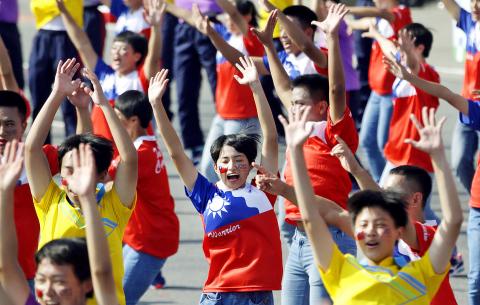President Tsai Ing-wen (蔡英文) yesterday in her Double Ten National Day address rejected the “one country, two systems” model proposed by Beijing as the future of cross-strait relations, while highlighting freedom, democracy and sovereignty.
“The overwhelming consensus among Taiwan’s 23 million people is our rejection of ‘one country, two systems,’ regardless of party affiliation or political position,” Tsai said at the ceremony in front of the Presidential Office Building in Taipei.
There would be no space for the existence of the Republic of China (ROC) if that framework were to be imposed on Taiwan, Tsai said, citing the violence in Hong Kong as an example.

Photo: Chiang Ying-ying, AP
As Taiwan’s president, standing up to protect the nation’s sovereignty is not a provocation to China, but a fundamental responsibility, she said, urging the public to stand with her in defending freedom and democracy.
Tsai said the term “Republic of China (Taiwan)” is an overwhelming consensus of Taiwanese society and not the exclusive property of any particular political party.
Touting her political achievements over the past three years, Tsai then outlined her goals, which are to unite people under the flags of freedom and democracy to defend sovereignty; to boost the nations’s economic power and national strength; and to overcome challenges and make the nation confident and proud of itself on the global stage.
Legislative Speaker Su Jia-chyuan (蘇嘉全) in his master-of-ceremonies address said that no totalitarian nation can stop free and democratic Taiwan from establishing new friendships, even though the nation’s diplomacy has been maliciously undermined.
Taiwanese pride could best be embodied by a “free spirit;” human rights are the shared belief of Taiwanese; and a well-developed democratic system has given Taiwanese strength, he said.
On the foundations of democracy, freedom and human rights, the nation has attained steady economic growth, created a wholesome social climate and won high acclaim for its healthcare system, he said, adding that the nation has also befriended many like-minded nations.
In a sense, as people make efforts to safeguard democracy, democracy is safeguarding them, Su said.
During his more than three years in office he has received 107 groups of lawmakers from other nations and they all expressed amazement at Taiwan’s democracy, Su said.
Although Taiwan faces many challenges in the international community, and its diplomacy has been maliciously compromised, freedom would ultimately prevail, he said.
The nation has been through colonialism and authoritarianism, but today it embraces democracy and freedom, and that means it is embraced by the rest of the world, he said, attributing this to the suffering, diligence and efforts of all Taiwanese.
Su expressed the hope that Taiwan’s virtues and progressiveness would be seen by the world; that the nation would forever stand unwavering in the Pacific no matter how great its future challenges are; and that future generations enjoy the freedoms enjoyed today and they are able to decide their own future.

CALL FOR SUPPORT: President William Lai called on lawmakers across party lines to ensure the livelihood of Taiwanese and that national security is protected President William Lai (賴清德) yesterday called for bipartisan support for Taiwan’s investment in self-defense capabilities at the christening and launch of two coast guard vessels at CSBC Corp, Taiwan’s (台灣國際造船) shipyard in Kaohsiung. The Taipei (台北) is the fourth and final ship of the Chiayi-class offshore patrol vessels, and the Siraya (西拉雅) is the Coast Guard Administration’s (CGA) first-ever ocean patrol vessel, the government said. The Taipei is the fourth and final ship of the Chiayi-class offshore patrol vessels with a displacement of about 4,000 tonnes, Lai said. This ship class was ordered as a result of former president Tsai Ing-wen’s (蔡英文) 2018

UKRAINE, NVIDIA: The US leader said the subject of Russia’s war had come up ‘very strongly,’ while Jenson Huang was hoping that the conversation was good Chinese President Xi Jinping (習近平) and US President Donald Trump had differing takes following their meeting in Busan, South Korea, yesterday. Xi said that the two sides should complete follow-up work as soon as possible to deliver tangible results that would provide “peace of mind” to China, the US and the rest of the world, while Trump hailed the “great success” of the talks. The two discussed trade, including a deal to reduce tariffs slapped on China for its role in the fentanyl trade, as well as cooperation in ending the war in Ukraine, among other issues, but they did not mention

HOTEL HIRING: An official said that hoteliers could begin hiring migrant workers next year, but must adhere to a rule requiring a NT$2,000 salary hike for Taiwanese The government is to allow the hospitality industry to recruit mid-level migrant workers for housekeeping and three other lines of work after the Executive Yuan yesterday approved a proposal by the Ministry of Labor. A shortage of workers at hotels and accommodation facilities was discussed at a meeting of the legislature’s Transportation Committee. A 2023 survey conducted by the Tourism Administration found that Taiwan’s lodging industry was short of about 6,600 housekeeping and cleaning workers, the agency said in a report to the committee. The shortage of workers in the industry is being studied, the report said. Hotel and Lodging Division Deputy Director Cheng

‘SECRETS’: While saying China would not attack during his presidency, Donald Trump declined to say how Washington would respond if Beijing were to take military action US President Donald Trump said that China would not take military action against Taiwan while he is president, as the Chinese leaders “know the consequences.” Trump made the statement during an interview on CBS’ 60 Minutes program that aired on Sunday, a few days after his meeting with Chinese President Xi Jinping (習近平) in South Korea. “He [Xi] has openly said, and his people have openly said at meetings, ‘we would never do anything while President Trump is president,’ because they know the consequences,” Trump said in the interview. However, he repeatedly declined to say exactly how Washington would respond in